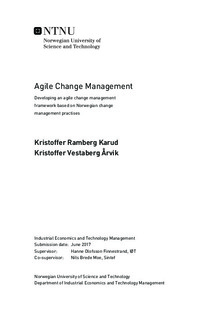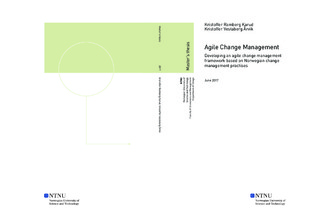| dc.description.abstract | Change management is a major challenge for organisations today, and one of the biggest challenges of change management is uncertainty. Companies are facing increasing competition, globalisation, and digitalisation, and changes happen faster than before. This demands flexible organisations able to change rapidly in uncertain environments, which makes plan-driven approaches to change management less suited.
The field of software development has faced similar challenges, which resulted in the development of so-called "agile methods", which are focused on dealing with uncertainty and being able to quickly adapt to changing environments. We argue that some of the concepts used in agile software development can be applied to change management as well. This could result in change management processes focused on dealing with uncertainty and quickly adapt to uncertain and unpredictable environments.
In this thesis, we develop a framework for agile change management based on a qualitative, empirical multiple-case study of Norwegian change management practices. The study is based on interviews with 28 informants from eight companies focusing on 13 different change cases. Several of these companies already use agile concepts in their approaches to change management. The empirical data are analysed using theoretical perspectives from both current change management literature and literature concerned with both agile concepts and uncertainty. The result of this analysis is a detailed framework specifying how companies can use agile concepts to manage change when faced with uncertainty.
The framework consists of two main parts and a set of prerequisites. The first part is the use of autonomous change teams. We argue that by using a multi-disciplinary change team with members from different levels of the organisation, one ensures that several different perspectives on the change are considered during the implementation. The team follows goals set by the top-management. In this way, the top-management sets the direction for the change, but the team is responsible for the actual implementation. We find that the team should be structurally separated from the rest of the organisation if the rest of the organisation is plan-driven to ensure the flexibility the team requires. We argue that the team leader should act as a facilitator for the team, which entails that the primary role of the leader is to enable the rest of the team to function. An aspect of this is that decisions should be made in a democratic fashion within the team, to ensure totality.
The second part of the framework is the agile change process. We argue that the change team should implement the change by using a series of short iterations. In practice, this entails that the change team breaks the goals set by the top-management down into sub-goals, where each sub-goal can be implemented separately in relatively short time. The team then implements changes to meet the sub-goals one at a time, in prioritised order. Each one of these change implementations is called an iteration. This allows the change team to re-evaluate the project in between iterations, re-prioritise and adjust sub-goals, and continuously evaluate the success and progress of the change project. We argue that this approach makes dealing with uncertainty easier, as the change team can adapt to unforeseen events during the implementation, by changing direction in between iterations. The prerequisites we identify, which an organisation needs to use agile change management efficiently, are: challenges related to uncertainty, a continuous view on change, a balance between short term and long term goals, an agile culture focused on involvement and cooperation, a low power distance between management and employees, understanding for the agile methodology, formalisation of the agile change processes, a certain amount of standardised processes, and defined channels and mechanisms for communication and feedback.
This thesis contributes to the field of change management in several ways. The thesis provides insight into how Norwegian companies manage change when faced with uncertainty. In addition, we show which concepts from the field of agile software development that can be used in change management. Based on these concepts and the insight in Norwegian companies change practices, we develop a framework which Norwegian companies can use for managing change in uncertain and unpredictable environments. | |

